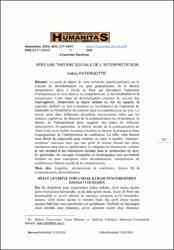| dc.contributor.author | Paternotte, Valery | |
| dc.date.accessioned | 2017-06-15T11:35:17Z | |
| dc.date.available | 2017-06-15T11:35:17Z | |
| dc.date.issued | 2016 | |
| dc.identifier.uri | https://hdl.handle.net/20.500.11776/1574 | |
| dc.description.abstract | Le point de départ de cette recherche interdisciplinaire est le concept de déverbalisation ou, plus généralement, de la théorie interprétative chère à l'école de Paris qui décompose l'opération d'interprétation en trois phases: la compréhension, la déverbalisation et la réexpression. Cette étape de déverbalisation continue de susciter des interrogations. Notamment la nature verbale ou non du support, le caractère délibéré ou non (volontaire ou involontaire) de l'opération de traduction ou l'importance du contexte dans la compréhension du sens. Ce travail puise dans différentes disciplines universitaires telles que les sciences cognitives, les théories de la communication ou, évidemment, la théorie de l'interprétation pour suggérer des pistes de réflexion constructives. En particulier, la théorie sociale de la communication de Alain Eraly nous semble de nature à éclairer la théorie, la pratique et donc l'enseignement de l'interprétation de conférence. En effet, cette théorie nous donne les arguments pour remettre en cause le modèle “émetteur-récepteur” classique ainsi que une grille de lecture faisant une claire distinction entre sens et signification; en intégrant les dimensions verbales et non verbales et les interactions sociales dans la construction du sens. En particulier, les concepts d'empathie et d'anticipation nous permettent d'établir un pont conceptuel entre déverbalisation, interprétation de conférence et théorie sociale de la communication. | en_US |
| dc.description.abstract | Bu disiplinler arası araştırmanın kalkış noktası, sözel dışına taşıma (déverbalisation) kavramıdır, ya da daha genel olarak, Ecole de Paris’nin benimsediği ve çeviri edimini üç aşamaya ayrıştıran çeviri kuramıdır: anlama, sözel dışına taşıma ve yeniden ifade. Bu sözel dışına taşıma aşaması hâlâ bazı soru işaretlerine yol açmaktadır. Özellikle de dayanağın sözel nitelikli olup olmaması, çeviri ediminin kasıtlı olup olmaması (istemli ya da istem dışı) ya da anlamın anlaşılmasında bağlamın önemi. Bu çalışma, kognitif bilimler, iletişim kuramları ya da elbette çeviri kuramı gibi çeşitli akademik disiplinlerden yola çıkarak yapıcı bazı düşünce izlekleri önermektedir. Özellikle de Alain Eraly’nin sosyal iletişim kuramı bizce konferans çevirisi kuramına, pratiğine ve dolayısıyla öğretimine ışık tutabilecek nitelikle görünmektedir. Gerçekten de bu kuram, anlam inşasına sözel ve sözel olmayan boyutlarla toplumsal etkileşmeyi dâhil etmek suretiyle, klasik “verici-alıcı” modelini sorgulamayı ve anlamla anlamlandırma arasında net bir ayrım yapan bir okuma modelini mümkün kılan savlar sunmaktadır. Özellikle empati ve kestirme kavramları, sözel dışına taşıma, konferans tercümanlığı ve toplumsal iletişim kuramı arasında kuramsal bir köprü kurmamızı sağlamaktadır. | en_US |
| dc.description.abstract | The starting point of this article is the concept of deverbalization, which belongs to the so-called Ecole de Paris. Their theory decomposes the translation process into three phases: understanding (or comprehension), deverbalization and re-expression. This particular phase called “deverbalization” still raises many theoretical issues. In particular, the nature of its support (verbal or not), its voluntary nature itself or the way in which context is instrumental to construct the meaning. This interdisciplinary research uses recent results from cognitive sciences, translation studies, and sociology of communication to find building blocks for a broader theory answering these questions. Among those answers, we believe that Alain Eraly's social theory of communication has a privileged place. As a matter of fact, it allows us to deconstruct the classical “emitter-receiver” model; it provides a theoretical model integrating verbal and non-verbal dimensions into the meaning of any communication, and focuses on social interactions as a critical dimension to help interpreters in their profession. Among others, we underline the importance of empathy and anticipation to link different disciplines like theory of communication, sociology and conference interpreting. The aim of this article is to present this theory and to show how it can reshape the theory, practice and teaching of conference interpreting. | en_US |
| dc.language.iso | fra | en_US |
| dc.publisher | Namık Kemal Üniversitesi, Fen-Edebiyat Fakültesi | en_US |
| dc.rights | info:eu-repo/semantics/openAccess | en_US |
| dc.subject | Empathie | en_US |
| dc.subject | interprétation de conférence | en_US |
| dc.subject | théorie de la communication | en_US |
| dc.subject | déverbalisation | en_US |
| dc.subject | Empati | en_US |
| dc.subject | Konferans Çevirmenliği | en_US |
| dc.subject | Sözlü İfade Teorisi | en_US |
| dc.subject | Eğitim | en_US |
| dc.subject | İletişim Kuramı | en_US |
| dc.subject | Empathy | en_US |
| dc.subject | Deverbalization | en_US |
| dc.subject | Conference Interpreting | en_US |
| dc.subject | Training | en_US |
| dc.subject | Theory of communication | en_US |
| dc.title | VERS UNE THEORIE SOCIALE DE L'INTERPRETATION | en_US |
| dc.title.alternative | SÖZLÜ ÇEVİRİYE TOPLUMSAL KURAM PENCERESİNDEN BAKMAYI DENEMEK | en_US |
| dc.title.alternative | TOWARDS A SOCIAL THEORY OF INTERPRETATION | en_US |
| dc.type | article | en_US |
| dc.relation.ispartof | HUMANITAS - Uluslararası Sosyal Bilimler Dergisi | en_US |
| dc.department | Tekirdağ Namık Kemal Üniversitesi Dergileri | en_US |
| dc.identifier.volume | 4 | en_US |
| dc.identifier.issue | 8 | en_US |
| dc.identifier.startpage | 257 | en_US |
| dc.identifier.endpage | 269 | en_US |
| dc.relation.publicationcategory | Makale - Ulusal Hakemli Dergi - Kurum Öğretim Elemanı | en_US |



















